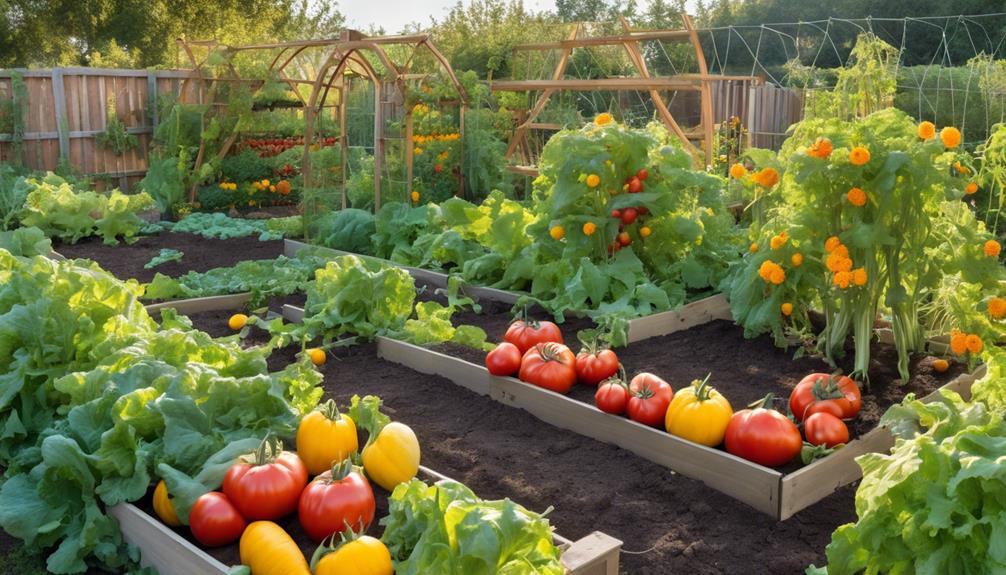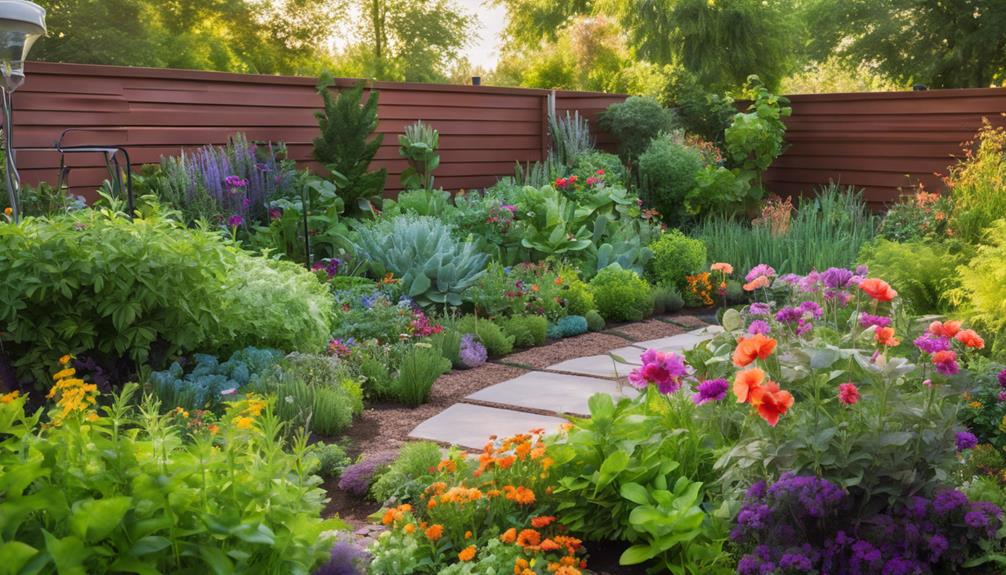
7 Best Garden Maintenance Services for Small Backyards
28 September 2024
What to Consider When Choosing Garden Maintenance Services?
29 September 2024To achieve a thriving flower garden, prioritise three crucial practices.
Initially, establish a consistent watering schedule, ensuring that plants receive about one inch of water per week, particularly in the early morning to minimise evaporation.
Secondly, improve soil quality through testing and amendments, incorporating organic fertilisers such as compost to elevate nutrient levels.
Ultimately, implement effective pest control strategies, such as introducing natural predators and utilising companion planting techniques to promote ecological balance.
By focusing on these foundational aspects, you'll create a vibrant garden that flourishes, with more practical insights awaiting your exploration.
Garden Health and Maintenance
Maintaining a healthy flower garden requires a consistent approach to watering, fertilisation, and soil care.
Establishing a regular watering schedule ensures that plants receive adequate moisture, while appropriate fertilisation provides crucial nutrients for growth.
Furthermore, proper soil management supports root development and overall plant vitality, forming the foundation for a thriving garden.
Regular Watering Schedule
A well-structured watering schedule is vital for the health and vitality of any flower garden. Consistency in watering fosters deep root development, enabling plants to withstand periods of drought and stress.
It is important to assess your garden's specific needs, as factors such as plant type, soil composition, and climate greatly influence water requirements. Early morning is the ideal time for irrigation, as it reduces evaporation and allows foliage to dry, minimising the risk of fungal diseases.
Aim for a thorough soaking that penetrates the root zone, generally providing about one inch of water per week, adjusting as necessary based on rainfall. A diligent approach to watering will cultivate a vibrant, thriving garden, ensuring your flowers flourish throughout the growing season.
Fertilization and Soil Care
Effective fertilisation and soil care are essential components for nurturing a flourishing flower garden.
Begin by conducting a soil test to determine nutrient levels and pH balance. This will inform your choice of fertilisers, allowing for targeted amendments that optimise plant health.
Utilise organic fertilisers, such as compost or well-rotted manure, to improve soil structure and microbial activity. Incorporate these amendments into the top layers of soil to enhance nutrient availability.
Furthermore, practise mulching to retain moisture, suppress weeds, and maintain temperature. Regularly monitor soil moisture levels and adjust your watering practices accordingly.
Soil Quality and Composition
Soil quality and composition are critical factors in establishing a thriving flower garden.
Adjusting pH levels, incorporating organic matter, and introducing beneficial microorganisms can greatly improve soil health and fertility.
Ph Level Adjustment
Maintaining the appropriate pH level in garden soil is vital for optimal plant health and growth. A balanced pH, typically between 6.0 and 7.0, facilitates nutrient availability and enhances microbial activity, both of which are important for thriving flower gardens.
Adjusting soil pH requires precision and a good understanding of soil chemistry.
Consider these steps for effective pH level adjustment:
- Soil Testing: Regularly conduct soil tests to determine current pH levels and nutrient deficiencies.
- Lime Application: To raise pH, apply agricultural lime, ensuring even distribution and incorporation into the soil.
- Sulphur Utilisation: For lowering pH, elemental sulphur can be used, but monitor changes closely.
- Regular Monitoring: Continually assess pH levels to maintain balance and adjust as necessary for peak growth conditions.
Organic Matter Incorporation
Incorporating organic matter into garden soil significantly enhances its quality and composition, promoting healthy plant growth and resilience.
Augmenting soil with organic materials increases nutrient availability, improves moisture retention, and fosters a robust ecosystem.
Here are four fundamental types of organic matter to consider:
- Compost: Enriches soil with nutrients and beneficial microorganisms, enhancing overall fertility.
- Well-rotted manure: Provides a slow-release source of nutrients while improving soil structure.
- Leaf mould: Created from decomposed leaves, it enhances moisture retention and aeration in the soil.
- Green manure: Cover crops that are tilled back into the soil, increasing organic content and suppressing weeds.
Beneficial Microorganism Introduction
A healthy garden thrives on a diverse community of beneficial microorganisms that play a crucial role in improving soil quality and composition.
These microorganisms contribute to the complete ecosystem, ensuring that plants receive the necessary nutrients for optimal growth.
To effectively introduce and maintain these important organisms, consider the following strategies:
- Inoculation: Introduce specific microbial inoculants that target nutrient cycling and disease suppression.
- Organic Amendments: Incorporate compost and organic matter to provide habitat and sustenance for beneficial microbes.
- Mulching: Use organic mulch to retain moisture and promote microbial activity in the soil.
- Crop Rotation: Practice crop rotation to boost biodiversity and disrupt pest cycles, fostering a balanced microbial community.
Embracing these practices will cultivate a thriving, resilient garden ecosystem.
Soil Testing Techniques
Understanding soil testing techniques is vital for maintaining a flourishing flower garden.
Initially, proper soil sample collection is critical, followed by regular calibration of soil pH to guarantee ideal conditions.
Moreover, enhancing soil microbial activity can greatly improve plant health and productivity.
Initial Soil Sample Collection
Before planting a flower garden, collecting an initial soil sample is vital for determining the nutrient composition and pH levels of the soil. This foundational step informs future amendments and planting decisions, ensuring ideal growth for your flowers.
To effectively collect a soil sample, follow these steps:
- Choose Multiple Locations: Select several spots within the garden area to obtain a representative sample.
- Use Clean Tools: Use a clean spade or trowel to avoid contaminating the sample.
- Depth Matters: Collect samples from a depth of 15-20 centimetres, as this zone is important for root development.
- Mix Thoroughly: Combine samples in a clean bucket to create a composite sample for accurate analysis.
Regularly Calibrate Soil Ph
Regular calibration of soil pH is imperative for maintaining ideal conditions for flower growth.
Soil pH affects nutrient availability, microbial activity, and overall plant health. To ensure optimal pH levels, consider the following techniques:
- Utilise a Reliable pH Meter: Invest in a high-quality digital pH meter for precise readings.
- Conduct Regular Testing: Test your soil every season to monitor fluctuations and make adjustments as necessary.
- Sample Multiple Locations: Collect samples from different areas in your garden to obtain an accurate representation of soil conditions.
- Amend as Necessary: Based on test results, incorporate lime to raise pH or sulphur to lower it, ensuring a balanced environment for your flowers.
Soil Microbial Activity Enhancement
Soil microbial activity is a vital factor in nurturing a healthy flower garden, as it directly influences nutrient cycling, soil structure, and plant health.
To enhance microbial activity, employing effective soil testing techniques is essential. Here are four key methods to consider:
- Soil pH Testing: Regularly assess pH levels to ensure a conducive environment for microbial activity.
- Nutrient Analysis: Evaluate nutrient availability to identify deficiencies or excesses that may impede microbial growth.
- Organic Matter Measurement: Test for organic matter content, as it serves as a food source for beneficial microbes.
- Microbial Activity Assessment: Utilise methods such as soil respiration tests to directly measure microbial activity and health.
Implementing these techniques will significantly improve the vitality and resilience of your flower garden.
Improved Plant Growth Rates
While various factors affect plant growth, the implementation of strategic practices can significantly enhance growth rates. Key elements such as appropriate watering schedules, optimal light exposure, and timely pruning not only promote growth but also contribute to the overall vitality of your flower garden. Below are some fundamental practices and their emotional impact on gardeners:
| Practice | Emotional Impact |
|---|---|
| Consistent Watering | Reduces anxiety, increases confidence |
| Adequate Sunlight | Fosters joy and satisfaction |
| Regular Pruning | Instils a sense of control |
| Mulching | Promotes calm and tranquility |
| Observing Growth | Sparks enthusiasm and pride |
Soil Enrichment Techniques
To achieve optimal flower garden health, implementing effective soil enrichment techniques is crucial.
Methods such as compost tea application, mulch layering, and the use of worm castings can significantly enhance soil fertility and structure.
Each of these techniques offers unique benefits, contributing to vigorous plant growth and resilience.
Compost Tea Application
Rich in nutrients and beneficial microorganisms, compost tea serves as an excellent soil amendment that improves the overall health of flower gardens. By applying this nutrient-rich liquid, gardeners can enhance soil structure, promote microbial activity, and ultimately increase flower vitality.
To effectively use compost tea, consider the following steps:
- Brewing: Steep well-aged compost in water for 24-48 hours, ensuring aeration to cultivate aerobic bacteria.
- Dilution: Dilute the concentrated tea with water, typically at a ratio of 1:10, to prevent potential phytotoxicity.
- Application Timing: Apply during early morning or late afternoon to reduce evaporation and optimise absorption.
- Frequency: Use every 4-6 weeks throughout the growing season for optimal results.
Implementing these techniques will yield a thriving flower garden rich in health and beauty.
Mulch Layering Technique
Building on the foundation of healthy soil provided by practices such as compost tea application, the mulch layering technique offers another effective method for improving the soil in flower gardens.
This approach not only conserves moisture but also enriches soil structure and fertility over time. By strategically layering organic materials, gardeners can create a thriving ecosystem that benefits both plants and soil microorganisms.
Consider the following key elements of the mulch layering technique:
- Material Selection: Use a variety of organic materials such as straw, wood chips, or shredded leaves.
- Layer Thickness: Aim for a mulch layer thickness of 5-10 cm to optimise moisture retention.
- Decomposition: Incorporate some well-decomposed mulch to introduce beneficial microorganisms.
- Regular Maintenance: Refresh the mulch layer annually to sustain its benefits.
Worm Castings Top Dressing
Worm castings top dressing serves as an excellent method for enriching flower garden soil, providing a nutrient-dense improvement that promotes healthy plant growth.
This organic amendment, derived from the digestion of organic matter by earthworms, offers numerous benefits for your garden.
- Nutrient-Rich: Worm castings contain crucial nutrients such as nitrogen, phosphorus, and potassium, which are essential for blooming flowers.
- Microbial Activity: They enhance soil microbial life, improving nutrient uptake and overall soil health.
- Moisture Retention: Castings assist in retaining moisture in the soil, thereby reducing the frequency of watering.
- pH Balance: They help maintain ideal pH levels, fostering an optimal environment for a diverse range of plant species.
Incorporating worm castings into your flower garden will significantly enhance its vigour and resilience.
Pest Control Strategies
Effective pest control is crucial for maintaining a thriving flower garden.
Employing strategies such as introducing natural predators, utilising companion planting techniques, and applying organic pest deterrents can greatly reduce pest populations while promoting ecological balance.
Natural Predator Introduction
Introducing natural predators into your flower garden can be a highly effective strategy for managing pest populations without relying on chemical pesticides.
By fostering a balanced ecosystem, you can encourage the presence of beneficial insects that target common garden pests.
Here are four key benefits of introducing natural predators:
- Biodiversity Improvement: It increases the variety of species in your garden, promoting overall ecosystem health.
- Sustainable Pest Control: It reduces reliance on synthetic chemicals, leading to a safer environment for beneficial organisms and pollinators.
- Cost-Effective: It minimises expenditure on chemical pesticides and the maintenance costs associated with pest management.
- Long-Term Solutions: It establishes a self-regulating system that can adapt to varying pest pressures over time.
Implementing this strategy can lead to a flourishing flower garden.
Companion Planting Techniques
Building on the concept of fostering a balanced ecosystem through natural methods, companion planting emerges as another strategic approach to pest control in flower gardens.
By thoughtfully pairing certain plants, gardeners can deter pests and promote healthy growth.
Consider these effective companion planting techniques:
- Marigolds with Tomatoes: Marigolds repel nematodes and other harmful insects, thereby improving the health of tomatoes.
- Basil with Peppers: Basil not only enhances flavour but also repels aphids and spider mites.
- Nasturtiums with Cabbage: These vibrant flowers attract aphids away from cabbage plants, serving as a trap crop.
- Chives with Carrots: Chives deter carrot flies while enhancing plant vigour.
Implementing these techniques can significantly improve pest management whilst promoting biodiversity in your flower garden.
Organic Pest Deterrent Methods
Often overlooked, organic pest deterrent methods offer sustainable solutions for maintaining a healthy flower garden.
By employing these strategies, gardeners can effectively combat pests without harming beneficial organisms or the environment.
Here are four effective methods to consider:
- Neem Oil: Derived from the seeds of the neem tree, this natural pesticide disrupts the life cycle of pests.
- Diatomaceous Earth: A fine powder made from fossilised algae, it abrasively damages the exoskeletons of insects, leading to dehydration.
- Garlic Spray: This pungent concoction acts as a natural repellent, deterring a variety of pests.
- Beneficial Insects: Attracting ladybirds and lacewings can provide natural predation of harmful pests, promoting ecological balance.
Implementing these methods guarantees a robust and thriving floral ecosystem.
Why Choose TKL Birmingham Gardener
When it comes to selecting a gardening service, many homeowners find themselves weighing various options.
TKL Birmingham Gardener distinguishes itself through its dedication to excellence and personalised service. With a team of experienced horticulturists, TKL ensures that every flower garden is tailored to the specific needs of the client, taking into account factors such as soil type, climate, and plant selection.
Their expertise in sustainable gardening practices not only promotes the health of the plants but also supports the surrounding ecosystem.
Furthermore, TKL offers ongoing maintenance packages, enabling clients to enjoy their flourishing gardens without the burden of upkeep.
Common Gardening Misconceptions
Five common gardening misconceptions can lead to frustration and hinder the success of your flower garden.
One prevalent myth is that all plants require full sunlight; many actually thrive in partial shade.
Another misconception is that more water equals healthier plants; overwatering can lead to root rot.
Furthermore, some believe that organic gardening is ineffective, when in fact it often promotes long-term soil health and biodiversity.
A third fallacy is that you need expensive tools for success; basic, quality tools are often sufficient.
Ultimately, many assume that all perennials will return each year without care, neglecting the need for seasonal maintenance.
Final Thoughts on Gardening
Understanding common gardening misconceptions is crucial for fostering a successful flower garden, but it is equally important to reflect on your overall gardening experience.
A thoughtful review of your techniques can accelerate your progression towards mastery. Consider these pivotal aspects:
- Soil Health: Regularly assess and amend your soil to ensure optimal nutrient levels.
- Plant Selection: Choose varieties that thrive in your local climate and conditions for sustainable growth.
- Water Management: Implement efficient irrigation practices to prevent over- or under-watering.
- Continuous Learning: Stay informed through workshops, literature, and community engagement to refine your skills.




